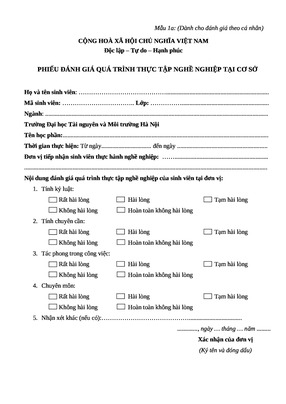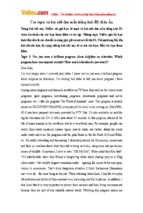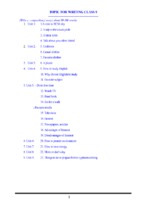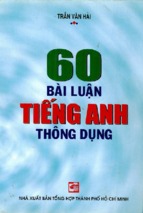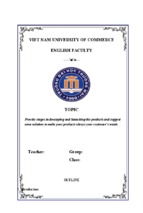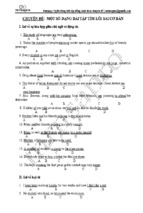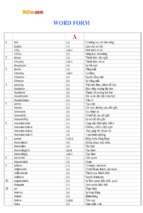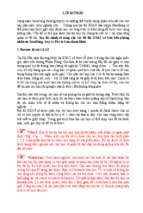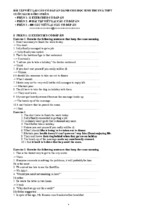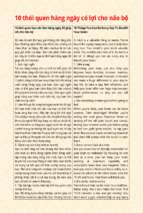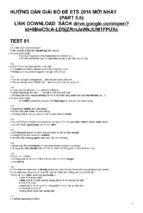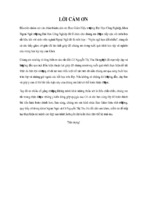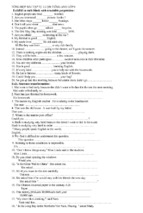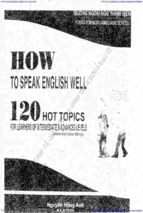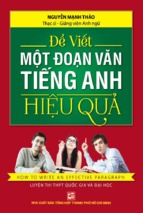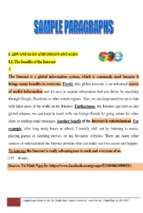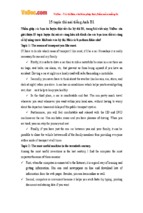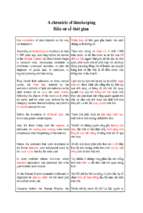61. SUPERSTITION
BAØN VEÀ MEÂ TÍN
OUTLINE
1. What is Superstition?
2. The evil of Superstition.
3. Knowledge the cure for Superstition.
Belief which has no basis1 in reason, is superstition. Superstition is the daughter of
Ignorance and Fear. The word literally means "standing still at" a thing in fear or awe.
In religion, superstition means irrational2 fear of the mysterious, and reverence for
objects which are not proper objects of worship. Ignorant savages have no scientific
knowledge of what we call the forces of Nature; they think the sun and the moon, fire
and wind and water, are governed by supernatural3 beings, who sometimes seem kind,
but more often terrible and cruel. These they fear and worship and try to propitiate with
offering and sacrifices and senseless rites. And their imagination peoples5 the universe
with imaginary beings-demons, ghosts and fairies. As knowledge grows, superstition
dies; and to-day we laugh at such beliefs and fears, as at the follies of childhood. But
superstition dies slowly; and even in civilized countries to day, silly bits of superstition
still linger6. You still find people who think the number thirteen unlucky, who will not
walk under a ladder, who feel troubled if they upset the salt or see the new moon
through glass, and who do mot like starting a journey on a Friday gods
In the Middle Ages in Europe, the belief in witchcraft8 led to the persecution9 of poor
old women, who were suspected of having sold their souls to the devil. The Spanish
Inquisition10 tortured and burnt thousands of good people, at the bidding of superstition.
And, though such horrors are no longer possible in civilized countries, superstition still
produces narrowmindedness, bigotry and needless mental suffering.
Superstition is a thing of darkness : it cannot stand11 the light. It is the child of
ignorance, and hates and flees from the face of knowledge. As knowledge increases,
superstition decreases. Science, which has discovered the real nature of the forces of
nature, has banished12 all the old bogies13 of superstition demons, ghosts and goblins14,
and all the creations of fear and ignorace which once made men afraid. And as our
knowledge grows and our wisdom ripens, we shall less and less believe without a sound
reason for belief until all superstition vanishes15 as a bad dream when we awake.
Meâ tín chính laø nieàm tin khoâng coù cô sôû, laø con gaùi cuûa söï ngu doát vaø loøng sôï haõi. Nghóa
saùt cuûa töø naøy "ñöùng yeân ôû" moät vaät vì sôï hoaëc neå. Theo toân giaùo, meâ tín coù nghóa laø sôï
haõi moät ñieàu huyeàn bí moät caùch voâ lyù, vaø toân thôø moät vaät theå khoâng ñaùng ñeå toân thôø. Loaøi
ngoaøi nguyeân thuûy ngu doát khoâng coù kieán thöùc khoa hoïc veà caùi chuùng ta goïi laø söùc maïnh
cuûa thieân nhieân. Hoï cöù nghó raèng maët trôøi vôùi maët traêng, löûa vôùi gioù vaø nöôùc, ñeàu ñöôïc
thoáng trò, bôûi nhöõng ñaáng sieâu nhieân maø ñoâi luùc toû ra raát toát laønh nhöng thöông thì ñoäc
aùc vaø hung baïo. Con ngöôøi sôï haõi vaø toân thôø nhöõng ñaáng naøy mong laøm hoï bôùt giaän baèng
söï cuùng teá, vaät hy sinh vaø leã nghi khoâng hôïp lyù. Vaø hoï töôûng töôïng ra moät theá giôùi ñaày
nhöõng vaät theå töôïng ma, quyû, vaø thaàn tieân. Khi kieán thöùc phaùt trieån, meâ tín töï taøn luïi. Vaø
ngaøy nay, chuùng ta cöôøi nhaïo nhöõng ñöùc tin vaø loøng sôï haõi nhö theá gioáng nhö söï ngu doát
ôû tuoåi thô. Tuy nhieân, meâ tín daàn daàn seõ maát ñi. Thaäm chí ôû caùc nöôùc vaên minh ngaøy nay,
nhöõng maãu chuyeän meâ tín buoàn cöôøi vaãn coøn toàn taïi. Baïn vaãn coøn thaáy nhieàu ngöôøi tin
raèng con soá 13 laø con soá xui. Raèng nhieàu ngöôøi khoâng ñi döôùi caùi thang. Raèng coù ngöôøi
tin vaøo söï raéc roái neáu hoï laøm ñoå muoái hay nhìn maët traêng leân qua laøn kính. Vaø thaäm chí
coù ngöôøi khoâng thích khôûi haønh vaøo ngaøy thöù saùu.
ÔÛ AÂu Chaâu, vaøo thôøi Trung Coå chính loøng tin vaøo ma thuaät ñöa ñeán caûnh saùt haïi nhöõng
phuï laõo ñaùng thöông bò haøm oan raèng ñaõ baùn linh hoàn cho quyõ döû. Cuoäc ñieàu tra cuûa
ngöôøi Taây Ban Nha ñaõ tra khaûo vaø thieâu soáng haøng ngaøn ngöôøi toát vì söï muø quaùng cuûa
meâ tín dò ñoan. Vaø maëc daàu nhöõng caûnh haõi huøng nhö vaäy khoâng coøn xaûy ra ôû caùc nöôùc
vaên minh, meâ tín vaãn saûn sinh ra nhöõng tö töôûng heïp hoøi, nieàm tin muø quaùng vaø noãi ñau
tinh thaàn vôù vaån khoâng ñaâu.
Meâ tín laø boùng ñeân taêm toái, khoâng theå chòu ñöôïc aùnh saùng. Ñoù laø moät ñöùa tre ngu doát,
gheùt boû vaø troán chaïy tri thöùc. Khi tri thöùc phaùt trieån meâ tín seõ taøn luïi. Khoa hoïc ñaõ khaùm
phaù ra baûn chaát thaät cuûa söùc maïnh thieân nhieân, ñaõ ñaùnh ñoå taát caû nhöõng caâu chuyeän coå
cuûa meâ tín : quæ, ma, vaø aùc quæ cuøng vôùi caùc moái sôï haixm meâ muoä laøm con ngöôøi sôï. Vaø
khi kieán thöùc chuùng ta lôùn maïnh vaø trí khoân cuûa chuùng ta ñaõ chín muøi, chuùng ta seõ caøng ít
tin hôn vaøo nhöõng ñieàu khoâng coù nguyeân nhaân cuï theå. Cho ñeán khi toaøn boä meâ tín chaám
döùt nhö moät giaác moäng taøn khi ñoù chuùng ta môùi coøn thöùc.
TÖØ MÔÙI :
1. basis /'beisis/ (n) : caên cöù -(n, pl) bases
2. irrational /i'r%~6nl/ (adj) : baát hôïp lyù, baát minh ñaïo lyù
3. supernatural /su:p6'n%t~ral/ (adj) : sieâu nhieân
4. to propitiate /pr6'pi~iet/ (v) : caàu xin, laøm... bôùt giaän, laøm hoøa
5. to people /'pi:p(6)l/ (v) : taïo ra... ñeå soáng trong
6. to linger /'li796(r)/ (v) : toàn taïi lai rai, löu laïi
7. to appease /6'pi:z/ (v) : laøm dòu
8. witchcraft /wit~kr%t/ (n) : ma thuaät, thuaät phuø thuûy
9. persecution /,p3:si'kju:~n/ (n) : söï khuûng boá, haønh haï
10. inquisition /inkwi'zi~n/ (n) : cuoäc ñieàu tra
11. to stand /st%nd/ (v) : chòu ñöïng; ñöùng tröôùc
12. to banish /'b%ni~/ (n) : khai tröø, truïc xuaát
13. bogy, bogie (bogey) /'b6$9i/ (n) : oâng ba bò
14. goblin /'94blin/ (n) : aùc quyû, ma quyû
15. to vanish /'v%ni~/ (v) : bieán maát, tieâu ñi maát
63. WHY WE ARE TAXED
TAÏI SAO CHUÙNG TA NAÏP THUEÁ
OUTLINE
1. Objections1 to taxes.
2. The reasons of taxation.
3. Each must bear his share of public expense.
Nobody likes paying taxes. Even those who know that taxation is necessary and just, do
not welcome the taxcollector as a bosom friend2. It is not pleasant to see part of your
monthly income taken away from you in incometax3; and the zamindar feels aggrieved4
that so much of his rents, or the profits of his labour, is carried off by government
officials. Ignorant people think this is an injustice and make a grievance5 of it; so it is
just as well that we should know why we are taxed, so that we can see the fairness6 of
the system.
Every country must have a government of some sort, or life would be impossible. The
primary duties of a government are to protect the life and property of the citizens, to
maintain law and order and settle disputes between citizens in a just and orderly way
through the law-courts, to defend the country from foreign foes, and to maintain the
roads and highways. Besides this, many governments maintain and direct education,
provide hospitals for the sick7, and attend to sanitation8. All these great public duties
need money : an army and navy have to be kept up, the police force and the judges have
to be paid, schools have to be provided and teachers supported, expert health-officers
and sanitary engineers have to be employed. Now where is all the money need for these
public services to come from? That question is answered by another, For whose benefit
are all these services maintained? The answer is, for the publics It is the people as a
whole, rich and poor, that benefit by security of life and property, by the sound9
administration of justice,by the maintenance of roads, by the public hospitals, public
schools, and good sanitation. Therefore it is only right that the public, the individual
citizens of the country, should contribute the money needed; for the money they give
comes back to them in the shape of these public benefits which all enjoy.
So long, therfore, as we have a good and efficient government, so long as our money is
being used in the right way, and so long as the burden of taxation is distributed10 fairly,
as different classes can bear it, we have no right to grumble at having to pay our share
of the taxes.
Khoâng ai thích ñoùng thueá. Cho duø ngöôøi ta bieát raèng ñoùng thueá laø ñieàu caàn thieát vaø coâng
baèng. Ñöøng ñoùn chaøo ngöôøi thu thueá nhö moät ngöôøi baïn taâm phuùc. Thaät chaúng vui tí naøo
khi nhìn thaáy moät phaàn löông haøng thaùng cuûa baïn phaûi ñoùng thueá lôïi töùc. Vaø ngöôøi ñòa
chuû raát ñau khoå vì tieàn thueá, hay tieàn laõi cuûa anh ta bò cuoái troâi. Ngöôøi ngu doát cho raèng
ñaây laø söï baát coâng vaø buoàn phieàn vì noù. Vì vaäy chuùng ta caàn bieát roõ lyù do phaûi ñoùng thueá
ñeå thaáy ñöôïc söï coâng baèng cuûa nhaø nöôùc.
Moãi nöôùc ñeàu phaûi coù moät chính phuû cai quaûn neáu khoâng cuoäc soáng khoâng theå coù ñöôïc.
Nhieäm vuï cô baûn cuûa chính phuû laø phaûi baûo veä ñôøi soáng cuøng cuûa caûi cuûa coâng daân, phaûi
oån ñònh luaät phaùp vaø traät töï xaõ hoäi, phaûi giaûi quyeát caùc cuoäc tranh chaáp cuûa caùc coâng
daân cho coâng baèng vaø ñuùng ñaén thoâng qua caùc toøa aùn phaùp luaät ; phaûi baûo veä ñaát nöôùc
choáng keû thuø beân ngoaøi, ñoàng thôøi phaûi giöõ gìn ñöôøng phoá vaø xa loä. Beân caïnh ñoù, nhieàu
chính phuû oån ñònh vaø laõnh ñaïo neàn giaùo duïc, xaây döïng beänh vieän cho ngöôøi oám vaø quan
taâm ñeán veä sinh. Taát caû nhöõng traùch nhieäm coâng lôùn lao naøy caàn tieàn : quaân ñoäi vaø haûi
quan phaûi ñöôïc traû löông ; löïc löôïng caûnh saùt vaø caùc quan toøa phaûi ñöôïc phaùt löông,
tröôøng hoïc phaûi ñöôïc trang bò vaø giaùo vieân phaûi ñöôïc boài döôõng, caùc chuyeân gia y teá vaø
caùc kyõ sö veä sinh phaûi ñöôïc traû coâng. Ngaøy nay taát caû soá tieàn daønh cho caùc dòch vuï coâng
coäng naøy ñeán töø ñaâu ? Caâu hoûi ñoù ñöôïc giaûi ñaùp baèng caùch khaùc.
Nhöng dòch vuï naøy giöõ lôïi ích cho ai ? Caâu traû lôøi cho quaàn chuùng, cho toaøn theå moïi
ngöôøi ; ngöôøi giaøu cuõng nhö ngöôøi ngheøo. Raèng ñaây laø lôïi ích cho söï an toaøn cuûa cuoäc
soáng vaø taøi saûn, cho söï vaän haønh chu toaøn cuûa coâng lyù, cho söï oån ñònh ñöôøng phoá, cho
caùc beänh vieän tröôøng hoïc coâng vaø cho tình traïng veä sinh ñöôïc toát. Do ñoù, chæ coù coâng
baèng khi quaàn chuùng, moãi coâng daân phaûi ñoùng goùp moùn tieàn caàn thieát, vì moùn tieàn naøy
trôû laïi ñem laïi lôïi ích cho moïi ngöôøi cuøng höôûng.
Do ñoù, chuùng ta coù ñöôïc moät chính phuû toát, coù naêng löïc caøng laâu daøi, moùn tieàn chuùng ta
söû duïng ñuùng choã caøng beàn laâu, vaø gaùnh naëng thueá ñöôïc phaân ñeàu vì moïi taàng lôùp ñeàu
chung söùc. Chuùng ta khoâng coù quyeàn than thôû phaûi ñoùng thueá.
TÖØ MÔÙI :
1. objection /6b'd2ek~(6)n/ (n) : söï phaûn ñoái, choáng ñoái
2. bosom friend /'buz(6)m frend/ (n) : ngöôøi baïn taâm phuùc
3. incometax /'1nk^mt%s/ (n) : thueá lôïi töùc
4. aggrieved /6'9ri:vd/ (adj) : Ex. to feel aggrieved : caûm thaáy ñau khoå
5. grievance /'9ri:v(6)ns/ (n) : söï buoàn loøng - to make a grievance of : laøm buoàn loøng vì...
6. fairness /'fe6n6s/ (n) : söï coâng baèng
7. the sick /sik/ (n) : nhöõng ngöôøi oám ñau
8. sanitation /s%ni'tei~(6)n/ (n) : söï veä sinh - sanitary
9. sound /s6$nd/ (adj) : kieän toaøn, chu ñaùo
10. to distribute /di'stribju:t/ (v) : phaân phoái, phaân phaùt
64. MODES OF TRAVELLING
NHÖÕNG MOÁT DU LÒCH
OUTLINE
Introduction : - Reasons, elements and methods of travel.
1. By land (a) On foot.
(b) Riding animals (hotses, etc.)
(c) Horse drawn vehicles.
(d) Railway-trains.
(e) Motor cars and bicycles.
2. By water(a) Boats and sailing ships.
(b) Steamships.
3. By airAir ships and Aeroplanes.
People travel for various reasons for business, pleasure and discovery; in different
elements land, water and air; and by divers1 methods, from walking to riding in trains,
ships and aeroplanes.
The simplest way of travelling by land is on Shanks's mare2 that is, on foot. This is the
only mode of travel for the poor man; but some who could afford to tour by train or
motor car, prefer, when travelling for pleasure, to walk.
From the most ancient times men have trained animals, such as the camel, the elephant,
the donkey, and especially the horse, to carry them, or to draw wheeled vehicles in
which they could rest in comfort; and in the days before railways were introduced, most
travellers rode on horseback, or in chariots3, carts carriages and coaches4.
But in these days, mechanical carriages, steam or petrol driven, have largely taken the
place of horse carriages. Even the poor can now travel quickly and comfortably in the
railway trains, and the well to do tour all over the country in their motor cars. The
humble bicycle, too, is a great great help to men of moderate6 means.
The boat, propelled7 by oars, and the sailing ship are very old inventions, and most of
the famous explorers made their discoveries in wooden sailing vessels. But the sailing
ship has now been almost driven from the ocean by the great steamers, which enable
travellers to accomplish8 sea voyages in weeks, which formerly took months, and even
years.
And now in our own century man has conquered the air, and can travel as the birds
travel. The wonderful invention of the air ship (or dirigible9 balloon) and the aeroplane
will, when regular lines of air crafy are estabished, enable travellers to cover10 in days
distances which take the fastest steamships weeks.
In all these modes of travel, men by their higher in telligence have harnessed11 the
forces of nature, to carry them over the world animal strength, wind, steam, gas and
electricity.
Ngöôøi ta du lòch vôùi nhieàu lyù do khaùc nhau vì coâng vieäc, vì nieàm vui, vaø vì khaùm phaù ; vôùi
nhöõng hình thöùc khaùc nhau treân ñaát lieàn, döôùi nöôùc, vaø treân khoâng, vaø vôùi caùc phöông
tieän khaùc nhau ñi boä, ñi xe, taøu löûa, taøu thuûy vaø maùy bay.
Caùch ñôn giaûn nhaát ñeå du lòch treân ñaát lieàn laø ñi boä. Ñaây laø phöông thöùc du haønh duy
nhaát cuûa ngöôøi ngheøo. Nhöng cuõng coù ngöôøi coù khaû naêng du lòch baèng taøu löûa hay xe hôi
thuù vò hôn khi ñi boä hoï du lòch ñeå tìm nieàm vui.
Töø thôøi xa xöa, con ngöôøi ñaõ bieát reøn luyeän ñoäng vaät nhö laïc ñaø voi, löøa vaø ñaëc bieät laø
ngöïa ñeå mang noù theo hay ñeå keùo xe chôû ngöôøi. Vaø tröôùc khi coù taøu hoûa, ngöôøi ta ñeàu ñi
baèng ngöïa hay xe ngöïa du haønh, xe ngöïa keùo vaø xe ngöïa boán baùnh.
Nhöng ngaøy nay, xe löûa, xe chaïy baèng hôi nöôùc hay xaêng ñeàu thay theá xe ngöïa. Ngaøy nay
thaäm chí ngöôøi ngheøo coù theå du lòch nhanh, thuaän lôïi baèng taøu löûa vaø ñi khaép trong nöôùc
baèng xe hôi. Ñi xe ñaïp khieâm toán cuõng laø moät phöông tieän coù ích raát lôùn ñoái vôùi ngöôøi söû
duïng phöông tieän caàn thieát.
Thuyeàn cheøo baèng maùi cheøo vaø taøu thuûy ñeàu laø nhöõng phaùt minh cuõ, vaø haàu heát nhöõng
ngöôøi thaùm hieåm noåi tieáng ñeàu coù nhöõng khaùm phaù veà vieäc cheá ra caùc loaïi thuyeàn buoàm
baèng goã. Nhöng taøu thuyeàn ngaøy nay chaïy baèng hôi nöôùc giuùp ngöôøi ñi laïi coù theå hoaøn taát
chuyeán ñi bieån trong maáy tuaàn maø thöôøng maát haøng thaùng trôøi hay caû naêm trôøi.
Vaø ngaøy nay, ôû theá kyû chuùng ta, con ngöôøi ñaõ chinh phuïc ñöôïc khoâng gian, vaø coù theå bay
nhö caùc loaøi chim. Phaùt minh tuyeät vôøi cuûa con taøu khoâng gian (hay khinh khí caàu coù
ngöôøi laùi) vaø maùy bay cho pheùp con ngöôøi vöôït qua nhöõng khoaûng caùch xa maáy ngaøy
ñöôøng maø taøu thuûy chaïy nhanh nhaát cuõng maát maáy tuaàn.
Trong taát caû caùc phöông thöùc du lòch, con ngöôøi vôùi trí thoâng minh hôn heát ñaõ chuyeån
duïng söùc maïnh cuûa thieân nhieân thaønh maõ löïc ñi khaép theá giôùi, söùc maïnh cuûa loaøi vaät, cuûa
gioù, cuûa hôi nöôùc, cuûa khí hôi vaø cuûa ñieän.
TÖØ MÔÙI :
1. divers /'daiv6:z/ (adj) : khaùc nhau, nhieàu loaïi
2. to ride Shank's (or Shank's) mare /ra1d '~%7ksme6/ (v) : cuoác boä
3. chariot /'t~%ri6t/ (n) : xe ngöïa nheï xe ngöïa du haønh
4. coach /k6u~/ (n) : xe ngöïa lôùn (4 baùnh xe)
5. a take the place of /te1k 56 ple1s 4v/ (v) : thay theá
6. moderate /m4d6reit/ (adj) : phaûi chaêng, ñieàu ñoä, tieát cheá
7. to propel /pr6'pel/ (v) : ñaåy ñi, thuùc ñi
8. to accomplish /6'k^mpli~/ (v) : hoaøn thaønh, hoaøn taát
9. dirigible /'dirid2ib(6)l/ (adj) : ñieàu khieån ñöôïc, taûi ñöôïc
10. to cover /k^v(6)r/ (v) : vöôït qua, ñi laïi
11. to harness /'ha:nis/ (v) : chuyeån duïng... thaønh maõ löïc
65. ARBITRATION
VIEÄC PHAÂN XÖÛ
OUTLINE
1. In law.
2. In place of war.
3. In place of strikes and lockouts1.
If two people have a dispute and cannot come to any agreement2, they may ask an
impartial3 third person to settle the question, both promising to abide4 by his decision.
This is what is meant by arbitration. And when we think of it, arbitration in some form is
as old as civilization; for every civil suit5 that is decided in a court of law is decided by
an arbitrator6 between the plaintiff7 and the defendant8 called a judge or magistrate9. In
the old days, such disputes were often settled by private wars; but in all civilized states,
such appeals to force by private citizens have long been abolished, and arbitration by
law has taken their place.
If arbitration could take the place of private wars within a state, why cannot it take the
place of public wars between states? Well, it has been tried and with some success. The
first great case settled by international arbitration was when England and America
referred their dispute about the privateer10, the Alabama, to an international tribunal11
which met at Geneva12 in 1872; and both countries loyally accepted its decision13. This
was one of those disputes which might easily have led to14 war between the two nations;
but war was averted15 by arbitration. Since then many arbitration treaties have been
made between different countries and many disputes settled peaceably in this way. But
still wars have continued.
The Hague Conference16 in 1899, which was called17 at the suggestion18 of the Tsar19 of
Russia, was an important step towards international arbitration20. It appointed a
permanent arbitration court called the Hague Tribunal, which, it was hoped, would make
wars a thing of past21. But two defects in the arrangement prevented the Hague Tribunal
from accomplishing much; one was the fact that the reference of desputes by nations to
this court was to be voluntary, and the other was the Tribunal's lack of any power to
enforce22 its decisions. This is the inherent23 weakness of all such schemes24. At the back
of a magistrate, is the police force; but what force is there to compel two great Powers to
abide by the orders of a court of arbitration? Anyway, this scheme did not abolish war;
for, fifteen years after it was established, the most awful war of history broke out.
The next step was the establishment of the League of Nations25 after the Great War,
which has undoubtedly accomplished something. But it has the same weakness as
stultified26the Hague Tribunal lack of authority and force. Still it is an inportant step in
the right direction; though war will not cease until the public opinion of all nations is
absolutelly against it.
Arbitration has also been frequently tried, and with a good deal of success, as a method
of settling disputes in the industrial world between employers and their men. Yet strikes
have not been abolished; in fact in recent years they have not been more frequent and
extensive than ever. Still there is hope that gradually arbitration will win its way, and
strikes and lockouts become things of the past.
Neáu hai ngöôøi tranh luaän khoâng theå ñi ñeán moät thoûa hieäp, hoï coù theå hoûi moät ngöôøi thöù ba
khoâng thieân vò ñeå giaûi quyeát vaán ñeà, caû hai höùa chòu nghe theo quyeát ñònh cuûa anh ta. Ñaây
chính laø coâng vieäc cuûa troïng taøi. Vaø khi chuùng ta baøn ñeán vieäc aáy, ôû hình thöùc naøo ñoù
coâng vieäc troïng taøi gioáng nhö söï khai hoùa môû mang. Ñoái vôi moãi moät vuï daân söï toá tuïng
ñeàu ñöôïc phaùn xeùt cuûa toøa aùn, ñöôïc chæ ñònh bôûi troïng taøi, giöõa hai beân nguyeân caùo vaø bò
caùo goïi laø quan toøa hay thaåm phaùn. Tröôùc ñaây, caùc cuoäc tranh chaáp thöôøng ñöôïc giaûi
quyeát baèng chieán tranh. Tuy nhieân ôû caùc nöôùc vaên minh, ngöôøi coâng daân buoäc phaûi baõi boû
hình thöùc naøy vaø luaät phaùt ñöa ra coâng vieäc troïng taøi ñeå thay theá.
Neáu troïng taøi coù khaû naêng ñaûm nhaän vai troø cuûa mình trong caùc cuoäc chieán trong nöôùc,
taïi sao troïng taøi laïi khoâng theå ñaûm nhaän trong caùc cuoäc chieán giöõa caùc nöôùc ? Ñuùng vaäy,
ñieàu ñoù ñaõ ñöôïc coá gaéng vaø ñaõ thaønh coâng ñaùng keå. Tröôøng hôïp lôùn lao ñaàu tieân ñöôïc
giaûi quyeát bôûi troïng taøi quoác teá laø khi hai nöôùc Anh vaø Myõ ñem vuï tranh chaáp veà daân
thuyeàn voõ trang Alabama leân toøa aùn quoác teá ôû Giô-ne-vô vaøo naêm 1872, vaø caû hai nöôùc
chaáp nhaän quyeát nghò ñuùng ñaén. Ñaây laø moät trong nhöõng cuoäc tranh chaáp coù theå deã ñöa
ñeán chieán tranh giöõa hai quoác gia. Nhöng nhôø coù troïng taøi, hai nöôùc traùnh khoûi chieán
tranh. Keå töø ñoù nhieàu troïng taøi ñaõ ñöôïc thieát laäp giöõa caùc nöôùc vaø nhieàu vuï tranh chaáp
ñöôïc giaûi quyeát eâm thaám baèng phöông phaùp naøy. Tuy vaäy, chieán tranh vaãn tieáp tuïc xaûy ra.
Hoäi nghò hoøa bình Hague naêm 1899 ñöôïc trieäu taäp theo lôøi ñeà nghò cuûa Nga Hoaøng laø
moät böôùc quan troïng cuûa troïng taøi quoác teá. Hoäi nghò ñaõ chæ ñònh moät troïng taøi vónh vieãn
goïi laø toøa aùn Hague. Ngöôøi ta hy voïng toøa aùn naøy seõ laøm caùc cuoäc chieán ñi vaøo queân
laõng. Nhöng hai khuyeát ñieåm trong hieäp öôùc naøy caûn trôû toøa aùn Hague hoaøn thaønh toát
coâng vieäc cuûa noù. Ñoù laø vieäc tham chieán caùc cuoäc xung ñoät giöõa caùc quoác gia mang tính
töï nguyeän, do ñoù ñoái vôùi caùc tröôøng hôïp khaùc thieáu söùc maïnh thi haønh nghò quyeát cuûa
Toøa. Ñaây laø söï yeáu ñuoái cuûa caùc keá hoaïch. Sau löng quan toøa laø löïc löôïng caûnh saùt. Tuy
nhieân söùc maïnh naøo baét buoäc hai löïc löôïng ñoái ñaàu nhau phaûi nghe theo phaùn xeùt cuûa toøa
aùn troïng taøi ? Duø sao chaêng nöõa, keá hoaïch naøy vaãn khoâng ñaùnh ñoå ñöôïc chieán tranh, vì
möôøi laêm naêm sau khi toøa aùn Hague ñöôïc thaønh laäp, caùc cuoäc chieán tranh taøn khoác nhaát
trong lòch söû vaãn cöù dieãn ra.
Böôùc tieáp theo laø thieát laäp Toå chöùc quoác teá lieân minh sau cuoäc ñaïi chieán ñaõ thaønh coâng
röïc rôõ. Tuy nhieân noù coù cuøng ñieåm yeáu laøm voâ hieäu hoùa toøa aùn Hague : thieáu quyeàn löïc
vaø thieáu söùc maïnh. Noù vaãn laø böôùc quan troïng trong vieäc xaùc ñònh ñuùng höôùng maëc daàu
chieán tranh vaãn khoâng chaám döùt cho ñeán luùc dö luaän cuûa caùc daân toäc tuyeät ñoái choáng laïi
chieán tranh.
Troïng taøi ñaõ coá gaéng, coù nhieàu thaønh coâng, nhö laø moät phöông phaùp daøn xeáp maâu thuaãn
trong giôùi coâng nghieäp giöõa oâng chuû vaø ngöôøi laøm coâng. Tuy theá, baõi coâng chöa ñöôïc xoùa
boû. Thöïc teá trong nhöõng naêm gaàn ñaây chöa bao giôø baõi coâng laïi lan roäng vaø thöôøng
xuyeân dieãn ra nhö vaäy. Vaãn coøn nieàm hy voïng raèng troïng taøi daàn daø seõ chinh phuïc, ñoàng
thôøi baõi coâng vaø vieäc beá toûa coâng xöôûng seõ ñi vaøo queân laõng.
TÖØ MÔÙI :
1. lockout /l4k0$t/ (n) : söï beá toûa coâng xöôûng (chuû nhaân caám thôï voâ xöôûng laøm vieäc tröø
phi thôï chòu nhaän moät soá ñieàu kieän)
2. agreement /6'9ri:m(6)nt/ (n) : söï thoûa hieäp
3. impartial /imp@:~(6)l/ (adj) : voâ tö, khoâng thieân vò
4. to abide (by) /6'baid/ (v) : chòu theo
5. civil suil /'si(6)l/ (n) : vuï daân söï toá tuïng, kieän caùo
6. arbitrator /'@:bitreit(6)r/ (n) : ngöôøi troïng taøi
7. plaintiff /'pleintif/ (n) : nguyeân caùo
8. defendant /di'fend(6)nt/ (n) : bò caùo
9. magistrate /'m%d2istreit/ (n) : vò thaåm phaùn
10. privateer /praiv6'ti6(r)/ (n) : daân thuyeàn ñöôïc voõ trang
11. international tribunal /int6n%~6n(6)l tra1'bju:nl/ (n) : toøa aùn quoác teá
12. Geveva /d21'n1:v6/ (n) : thaønh phoá Giô ne vô (taïi Thuïy só)
13. decision /di'si2(6)n/ (n) : quyeát nghò, quyeát ñònh
14. to lead to /li:d t6/ (v) : daãn tôùi, ñöa tôùi
15. to avert /6'v3:t/ (v) : traùnh
16. The Hague Conference /56 he19 'k4nf6r6ns/ (n) : Hoäi nghò Hoøa bình Hague (le Haye)
17. to call /k0:l/ (v) : trieäu taäp
18. suggestion /s6'd2est~(6)n/ (n) : lôøi ñeà nghò - to suggest (v)
19. Tsar (Czar) : Nga Hoaøng. n. /z@:/
20. international arbitration /1nt6'n%~n6l ,@:b1'tre1~n/ (n) : söï troïng taøi quoác teá
21. a thing of the past (n) : söï vieäc cuûa dó vaõng
22. to enforce /in't0:s/ (v) : thi haønh, thöïc haønh
23. inherent /in'her6nt/ (adj) : coá höõu, vaãn thöôøng coù
24. scheme /ski:m/ (n) : keá hoaïch
25. The League of Nations /56 l1:9 4v 'ne1~nz/ (n) : Toå chöùc Quoác teá Lieân minh
26. to stultify /'st^ltifai/ (v) : laøm cho voâ hieäu löïc
66. THE ADVANTAGES AND DISADVANTAGES OF GOOD MEMORY
SÖÏ LÔÏI VAØ HAÏI CUÛA TRÍ NHÔÙ TOÁT
OUTLINE
1. The importance of having a good memory, and its advantages.
2. Memory can be trained and improved.
3. The disadvantages of remembering everything.
There is no need to dwell on1 the importance of having a good memory. A bad memory
is such a handicap in life that every one realises the advantages of a good one. By a
good memory we mean a retentive2 and accurate memory, one that will retain3 for us
know ledge once gained, and retain it correctly. How slow and eratic4 is the progress of
a student who cannot remember what he has learnt ! He is like Sisyphus, the poor
wretch the Greek fable tells about, who was condemned to push a stone up a hill in
Hades5, which was for ever rolling down again before it reached the top. In business
life, a man who cannot remember his appointments and is always forgetting the orders
he receives, will soon be left behind6. A servant who forgets to do his work at the proper
time, quickly losses his job. One of the poorest excuses we can make for work undone
is, "I am awfully sorry; but I forgot!" And it is an excuse that is not excuse if it is made
too often. A good memory is essential for the student, the businessman, the employee,
the politician, the statesman in fact for every one in every walk of life7. It is necessary,
too, in social life; for a person who forgets his social engagements8 and can never
remember the faces of those he has met. Will not be a social sucess.
People with bad memories, however, need not despair; for even the worst memory can
be improved by training, like every other faculty. The chief cause of a bad memory is
inattention9, lack of concentration10. We often blame our memories for not retaining
knowledge, when as a matter of fact we never gave it the knowledge to retain. It is not
the memory that is to blame, but our lack of attention when learning. You read a book,
and at once forget all about it; you forget it because you never really read the book.
Your eyes passed over the words on the page, but your mind was wandering11, and you
never really took into your mind what the author wrote. The first step in training a
memory is to learn to concentrate our mind on what we are doing, and give it our whole
thought. We must learn to notice things, carefullly observe what we see, consciously12
and determinedly attend to what we are about; and the regular repetition of the
knowledge we have gained will quickly strengthen memory, till remembering becomes
a habit.
The only disadvantage of a good memory is our inability to forget things we do not want
to remember. There are events, desires, and thoughts in our past life which we would
like to forget. The only way to forget such unpleasant things is to fill our mind with good
thoughts. For you cannot forget by trying to forget.
Khoâng caàn baøn ñeán taàm quan troïng coù ñöôïc trí nhôù toát. Trí nhôù keùm laø moät caûn trôû trong
cuoäc soáng, seõ nhaän thaáy ñieàu thuaän lôïi khi coù moät trí nhôù toát. Noùi ñeán trí nhôù toát, chuùng
ta coù yù noùi ñeán moät trí nhôù coù söùc nhôù laâu, vaø chính xaùc, seõ baûo trì caùc kieán thöùc chuùng ta
thu löôïm ñöôïc vaø giöõ laïi. Thaät keùo daøi vôù vaån moät tieán trình tieáp thu kieán thöùc cuûa moät
sinh vieân coù trí nhôù keùm ! Anh ta raát gioáng Sisyphus, ngöôøi baát haïnh ñaùng thöông trong
caâu chuyeän nguï ngoân Hy Laïp bò xöû phaït neùm ñaù leân ngoïn ñoài seõ khoâng bao giôø laên trôû
xuoáng tröôùc khi leân ñeán ñænh ñoài. Trong ñôøi soáng thöông maïi, ngöôøi khoâng coù khaû naêng
nhôù caùc cuoäc heïn cuûa mình, seõ khoâng theå naøo nhôù ñöôïc coâng vieäc anh ta nhaän ñöôïc. Anh
ta seõ bò boû rôi. Moät vieân chöùc queân laøm vieäc ñuùng giôø giaác, seõ nhanh choùng maát vieäc. Moät
trong nhöõng caâu noùi toài teä nhaát chuùng ta vieän côù coâng vieäc chöa ñöôïc laøm xong laø "Toâi
thöïc söï hoái tieác, nhöng toâi ñaõ queân maát !". Vaø ñoù laø lôøi xin loãi nhöng khoâng phaûi xin loãi
neáu cöù laëp laïi maõi. Sinh vieân raát caàn coù trí nhôù toát. Thöïc teá, trí nhôù raát caàn thieát cho moïi
giôùi. Trong ñôøi soáng xaõ hoäi, trí nhôù cuõng raát caàn thieát. Ñoái vôùi ngöôøi queân caùc cuoäc heïn
ngoaøi xaõ hoäi ñoàng thôøi khoâng theå nhôù ñöôïc göông maët cuûa nhöõng ngöôøi anh ñaõ gaëp, seõ
khoâng thaønh coâng trong xaõ hoäi.
Tuy nhieân ngöôøi coù trí nhôù toài khoâng neân tuyeät voïng, bôûi vì trí nhôù toài nhaát thaäm chí coù
theå hoài phuïc ñöôïc baèng reøn luyeän nhö caùc chöùc naêng khaùc. Nguyeân nhaân chính cuûa trí
nhôù toài laø söï khoâng ñeå yù, thieáu söï taäp trung. Chuùng ta thöôøng xaáu hoå vì trí nhôù keùm cuûa
chuùng ta. Khoâng löu giöõ ñöôïc kieán thöùc, khi maø moät söï kieän ñöa ñeán chuùng ta khoâng cho
noù moät kieán thöùc ñeå löu giöõ laïi. Ñoù khoâng phaûi laø trí nhôù maø phaûi hoå theïn maø laø thieáu söï
chuù yù khi ta hoïc. Baïn ñoïc saùch, vaø ngay laäp töùc queân ñi taát caû. Baïn queân bôûi vì baïn thaät
söï khoâng bao giôø ñoïc saùch. Maét baïn löôùt qua caùc chöõ treân trang giaáy nhöng taâm trí baïn
ñang lang thang. Vaø baïn thaät chöa bao giôø ñem vaøo ñaàu nhöõng lôøi taùc giaû vieát. Böôùc ñaàu
trong vieäc reøn luyeän trí nhôù laø phaûi hoïc caùch taäp trung trí oùc vaøo ñieàu chuùng ta laøm vaø
ñöa ra toaøn boä yù kieán cuûa chuùng ta. Chuùng ta phaûi hoïc ñeå yù caùc söï vaät, quan saùt caån thaän
nhöõng gì chuùng ta nhìn thaáy, vaø taäp trung moät caùch coù yù thöùc vaø quyeát taâm ñeán ñieàu
chuùng ta seõ laøm. Vaø söï laëp laïi thöôøng xuyeân kieán thöùc chuùng ta coù ñöôïc seõ nhanh choùng
laøm trí nhôù phuïc hoài, cho ñeán luùc trí nhôù trôû thaønh thoùi quen.
Ñieàu baát lôïi duy nhaát cuûa trí nhôù toát laø chuùng ta khoâng coù khaû naêng queân nhöõng ñieàu
chuùng ta khoâng muoán nhôù. Coù nhöõng söï kieän, öôùc mô vaø tö töôûng trong cuoäc soáng quaù
khöù maø chuùng ta muoán queân. Caùch duy nhaát ñeå queân nhöõng ñieàu khoâng thuù vò ñoù baïn phaûi
laáp ñaày taâm tri baïn nhöõng yù töôûng toát ñeïp. Vì baïn khoâng theå queân baèng caùch coá queân.
TÖØ MÔÙI :
1. to dwell on /dwel 4n/ (v) : baøn veà
2. retentive /r1'tent1v/ (adj) : coù söùc nhôù laâu, coù tính caùch baûo trì
3. to retain /r1'te1n/ (v) : baûo trì, giöõ laïi
4. erratic /1'r%t1k/ (adj) : baát thöôøng, vôù vaån
5. Hades /'heidi:z/ (n) : aâm phuû, aâm ty
6. to be left behind /lef't bi'haind/ : bò boû rôi (laïi sau)
7. in every walk of life : trong moïi giai caáp
8. engagement /1n'9e1d2m6nt/ (n) : söï öôùc ñònh, heïn gaëp
9. inattention /,1n6'ten~n/ (n) : söï khoâng chuù yù
10. concentration /,k4nsn'tre1~n/ (n) : söï taäp trung, söùc chuù yù
11. to wander /'w4nd6/ (v) : phieâu löu, ñi lang thang
12. consciously /'k4n~6sl1/ (adv) : moät caùch coù yù thöùc
67. GOOD MANNERS
LEÃ PHEÙP
OUTLINE
1. The necessity of good manners.
2. The essence of good manners.
3. The true gentleman.
Bad manners are always objectionable1. We can excuse ignorant and badly brought up
people, who know no better; but there are many, who do know better, who pride2
themselves on being rude and off hand; and these we cannot excuse. Some of these
people (conceited fellows!) think that rudeness is a sign of independence and manliness.
And others say that politeness is a form of in sincerity, and hold that to say that you are
glad to see a person whom you really dislike, or that you are sorry when a visitor has to
leave when all the time you are glad to get rid of him, or to ask after a person's health
when you do not care whether he is alive or dead, is simply hypocrisy3. There may be
something in this objection; and yet a little innocent pretence and a few mild "social
lias," may be less morally wrong than the unnecessary wounding of people's feelings.
Even if you do not like a man, it is not always necessary to tell him the brutal truth.
Good manners may be superficial, and sometimes they may be a little insincere; but
they are as necessary to the continuance4 of society as oil is to the working of a machine
without friction5. And with people who have naturally kind hearts, politeness is neither
insincere nor artificial6. For the essence of good manners is consideration for the
feelings of others; and surely this is a virtue. Some one has called good manners
"surface religion", because the essence of true religion is unselfish sympathy. You
cannot like or approve7 of all you meet; but you can and must learn to be kind to all,
even to your enemies; and the least you can do is to treat them courteously8. There is
enough sorrow in the world without our trying to increase it by unnecessary unkindness,
which is the essence of bad manners. And it costs so little to be polite showing respect
without servility9 to our superiors10, courtesy to our equals11, and consideration for those
below us.
The true gentleman is one who instinctively12 thinks of the feelings, the comfort and
happiness of others before his own. He will therefore be courteous to all. And there are
true gentlemen,nature's gentlemen, even amongst the poor and ignorant, who, though
they have not had the chance of learning all the rules of etiquette, have kind hearts.
Khoâng coù leã pheùp luoân bò gheùt boû. Chuùng ta coù theå tha thöù veà söï baát caån cuûa hoï voán
khoâng bieát leã pheùp toát hôn. Tuy nhieân cuõng coù nhieàu ngöôøi bieát cö xöû ñeïp hôn laïi töï haøo
veà haønh vi thoâ baïo. Ñoái vôùi haïng ngöôøi naøy chuùng ta khoâng theå tha thöù. Moät soá ngöôøi
(nhöõng gaõ töï phuï !) cho raèng tính thoâ loã laø daáu hieäu cuûa töï do vaø nam tính. Nhöõng keû
khaùc cho raèng lòch söï laø hình thöùc cuûa loøng chaân thaønh ñoàng thôøi phaùt bieåu raèng noùi nhö
vaäy laø baïn toû yù vui möøng gaëp ngöôøi baïn thaät söï khoâng thích hoaëc baïn toû yù buoàn khi moät
ngöôøi khaùch phaûi rôøi boû toaøn boä thôøi gian baïn muoán toång coå anh ta hay phaûi hoûi thaêm
söùc khoûe ngöôøi maø baïn thaät söï khoâng caàn bieát ñeán anh ta coøn soáng hay ñaõ cheát. Ñoù laø
haønh ñoäng ñaïo ñöùc giaû. Coù theå ñieàu gì ñoù trong söï giaû doái naøy. Vaø maëc daàu coù moät söï
giaû vôø ngaây thô cuøng vôùi nhöõng lôøi noùi doái nheï nhaøng coù theå ñoù laø haønh ñoäng ñaïo ñöùc
giaû ñuùng hôn laø veát thöông nhoû nhaët xuùc phaïm ñeán tình caûm con ngöôøi. Thaäm chí neáu baïn
khoâng thích moät ngöôøi, khoâng nhaát thieát luùc naøo cuõng noùi vôùi anh ta söï thaät taøn nhaãn ñoù.
Leã pheùp coù theå chæ laø beà maët vaø ñoâi luùc coù theå khoâng chaân thaät. Tuy nhieân noù cuõng raát
caàn thieát cho tính lieân tuïc cuûa xaõ hoäi gioáng nhö daàu tra vaøo ñeå maùy chaïy maø khoûi bò coï
xaùt. Vaø nhöõng ngöôøi coù loøng chaân thaät töï nhieân, tính lòch söï xuaát phaùt töø loøng chaân thaät,
khoâng heà giaû maïo. Vì tính quan troïng cuûa leã pheùp ñöôïc xem laø tình caûm cuûa con ngöôøi.
Vaø chaéc chaén ñaây phaûi laø ñaïo ñöùc thaät. Coù ngöôøi goïi leã pheùp laø "beà maët cuûa toân giaùo"
bôûi vò söï caàn thieát cuûa toân giaùo thaät chính laø söï ñoàng caûm hoaøn toaøn. Baïn khoâng theå thích
hay taùn thaønh taát caû ñieàu baïn gaëp phaûi. Nhöng baïn phaûi bieát töû teá vôùi taát caû moïi ngöôøi,
thaäm chí vôùi keû thuø cuûa baïn. Vaø ñieàu ít ra baïn coù theå laøm laø cö xöû nhaõ nhaën vôùi hoï. Treân
theá gian naøy, khoâng caàn phaûi coá taïo theâm nhöõng noåi buoàn caàn thieát ñaõ coù ñuû noãi buoàn maø
voán laø caùi caàn thieát cho caùi goïi laø khoâng coù leã pheùp. Ñoàng thôøi ñaâu coù toán keùm bao nhieâu
khi baïn toû ra lòch thieäp voán theå hieän loøng kính troïng thaúng thaéng cuûa baïn ñoái vôùi ngöôøi
treân, nhaõ nhaën vôùi ngöôøi cuøng löùa vaø quan taâm ñeán nhöõng ngöôøi thaáp hôn.
Ngöôøi lòch thieäp thaät söï laø ngöôøi nghó ñeán tình caûm, ñieàu kieän vaø haïnh phuùc cuûa ngöôøi
khaùc theo baûn naêng tröôùc khi nghó ñeán baûn thaân. Do ñoù, anh ta seõ nhaõ nhaën vôùi taát caû
moïi ngöôøi. Vaø coù nhöõng ngöôøi lòch duyeät thaät söï, nhöõng ngöôøi lòch duyeät töï nhieân, thaäm
chí trong soá nhöõng ngöôøi ngheøo vaø khoâng coù hoïc voán nghó raèng hoï khoâng coù cô hoäi hoïc
hoûi taát caû nguyeân taéc xöû theá, hoï ñeàu coù traùi tim nhaân haäu.
TÖØ MÔÙI :
1. objectionable /6b'd2eck~n6bl/ (adj) : ñaùng gheùt, ñaùng cheâ traùch
2. to pride oneself on /pra1d w^n'self/ (v) : laáy laøm kieâu haõnh
3. hypocrisy /hi'p4kr6si/ (n) : tính ñaïo döùc giaû
4. continuance /k6n'tinj$6ns/ (n) : söï tieáp tuïc, lieân tuïc
5. friction /'frik~n/ (n) : söï coï saùt
6. artificial /@:t1'fil/ (adj) : giaû taïo
7. to approve (of) /6'pru:v/ (v) : taùn thaønh, chaáp nhaän
8. courteously /'k3:ti6sli/ (adv) : coù leã pheùp, leã ñoä
9. servility /'s3:viliti/ (n) : veû khuùm nuùm, luoàn cuùi
10. superior /su:pi6ri6(r)/ (n) : ngöôøi beà treân
11. equal /'i:kw6l/ (n) : ngöôøi ngang haøng
12. consciously /'k4n~6sli/ (adv) : theo thieân tính. baûn naêng
68. THE FACE AS AN INDEX OF CHARACTER
KHUOÂN MAËT TIEÂU BIEÅU PHAÅM TÍNH
OUTLINE
1. Choosing by faces.
2. Character forms faces.
3. The art of reaking faces.
A businessman I knew told me that, when he was engaging an employee, he always
insisted on1 personally2 interviewing the candidates for the post. He scarcely ever read
their testimonials3, which he considered to be worth little; and he did not pay much
attention to what each man said; but he watched his face as he talked. "I choose them,"
he said, "by their faces." And many a time he selected a man who had very little in the
way of recommedations4 to show, and promptly rejected some who brought a whole file
of excellent testimonials. And he was rarely wrong in his choice.
A man's face, if we can read it aright, is indeed an index of his character. We can tell
what sort of man he is by the expression of his countenance5, as we can tell the species
of shell-fish6 by its shell; for as a shellfish secretes7 its shell, so the soul secretes its
physical face. It is we ourselves who make our faces; and we make them gradually and
unconsciously to express our inner character. Character is simply the sum total of
confirmed habits8; and as a habit is formed, it slowly writes its characteristic marks on
the face, and gives its own look to the eyes. It is harder to read character in the faces of
unformed9 children than in the faces of grown men and women, though one can
generally detect meanness or frankness10 even in the face of a child; but the older
people get and the more fixed their habits, the easier it becomes to tell what sort of
people they are from their faces.
Certain kinds of faces almost anyone can read. You cannot mistake the red and bloated11
face of the drunkard, the sour face12 of the discontented13, the pride in the face of the
arrogant, the crafty look in the eyes of the sneak14. But it takes a trained and careful
observer to read some faces, for some clever people can make their faces like masks to
hide their real selves. A false hearted man may have an apparently frank and open face;
a cruel man may wear a deceptively15 kindly smile; a rogue may look very honest at first
sight. As Hamlet said, "A man may smile and smile, and be a villain." But there is
always something in the face that will betray16 such people to an acute observerespecially in the most expressive features, the eyes and the mounth. A look in the eyes,
the way he shapes his mouth, may betray the hidden meanness, cruelty, craftiness17 or
selfishness that lurks behind the friendly smile and the frank look. Certain it is that
dishonesty, lust and cruelty, honesty, purity and kindness, all leave their indelible marks
on the face.
Moät thöông gia toâi quen bieát cho raèng khi oâng ta tìm moät ngöôøi laøm vieäc, oâng luoân höôùng
ñeán cuoäc phoûng vaán veà nhaân caùch ñeå choïn moät öùng cöû vieân cho chöùc vuï troáng. OÂng ta ít
khi ñoïc caùc giaáy giôùi thieäu ngöôøi ñeán xin vieäc maø oâng voán cho raèng coù giaù trò raát ít. OÂng
cuõng khoâng quan taâm ñeán nhöõng lôøi noùi cuûa anh ta, maø nhìn vaøo maët anh ta trong luùc
ñang noùi. OÂng seõ noùi "toâi choïn hoï qua göông maët phaûn aùnh cuûa hoï". Vaø ñaõ nhieàu laàn oâng
tuyeån choïn nhaân vieân khoâng qua söï giôùi thieäu nhöng coù ñöôïc toaøn boä thoâng tin chính xaùc
phaûn aùnh lôøi giôùi thieäu tuyeät vôøi. Vaø oâng hieám khi sai trong vieäc choïn löïa cuûa oâng.
Göông maët con ngöôøi neáu chuùng ta bieát ñoïc, quaû laø moät taám baûng phaûn chieáu phaåm caùch.
Baèng vieäc bieåu hieän dieän dung chuùng ta coù theå noùi anh ta thuoäc loaïi ngöôøi naøo cuõng
gioáng nhö chuùng ta noùi loaøi soø heán qua voû cuûa noù vì ñoái vôùi loaïi soø heán aån döôùi voû cuûa
noù. Vì theá taâm hoàn naáp döôùi beà maët vaät theå. Chính chuùng ta taïo neân göông maët cuûa chuùng
ta, noù seõ daàn daàn thaønh hình ñoàng thôøi phaåm caùch beân trong cuûa chuùng ta seõ bieåu hieän
moät caùch voâ thöùc qua hình daïng cuûa göông maët. Phaåm tính ñôn giaûn laø toaøn boä caùc thoùi
quen ñöôïc xaùc ñònh. Vaø khi thoùi quen ñöôïc hình thaønh, noù daàn daø vieát leân caùc daáu hieäu
phaåm tính treân göông maët cuøng vôùiö daáu hieäu caùc tia nhìn qua aùnh maét. Do ñoù ñoïc taùc
phaåm tính treân göông maët treû con khoù hôn göông maët cuûa ngöôøi ñaõ tröôûng thaønh. Maët
daàu noùi chung ngöôøi ta coù theå khaùm phaù yù nghóa hay tính chaân thaät thaäm chí treân göông
maët cuûa treû. Tuy nhieân ngöôøi lôùn caøng töøng traûi caøng coù ñöôïc caùc thoùi quen hoãn hôïp, vaø
caøng deã ñoaùn ñöôïc töø göông maët hoï thuoäc loaïi ngöôøi naøo.
Moät soá göông maët gaàn nhö khoâng ai ñoïc ñöôïc. Baïn khoâng theå laàm göông maët ñoû, aên,
uoáng quaù ñoä cuûa keû say röôïu, veû maët chua cay cuûa ngöôøi khoâng haøi loøng, veû töï haøo treân
göông maët cuûa keû töï phuï kieâu caêng, tia nhìn sôï seät trong aùnh maét cuûa keû leùn luùt. Nhöng
phaûi taäp laøm ngöôøi quan saùt caån thaän môùi ñoïc ñöôïc nhöõng neùt treân göông maët. Vì moät soá
ngöôøi khoân ngoan coù theå taïo neân göông maët giaû, haàu che ñaäy göông maët thaät cuûa hoï.
Ngöôøi gian doái coù theå coù göông maët thaät söï. Moät ngöôøi ñoäc aùc coù theå coù nuï cöôøi töû teá giaû
taïo. Keû löøa ñaûo coù theå ngay töø caùi nhìn ñaàu tieân troâng haén ta raát trung thöïc. Nhö Haêm leùt
ñaõ noùi. Moät ngöôøi cöôøi luoân mieäng coù theå laø keû hung aùc". Tuy nhieân luoân coù moät ñieàu naøo
ñoù toû daáu phaûn ngöôïc laïi vôùi loaïi ngöôøi naøy vaø chæ coù ngöôøi quan saùt am töôøng môùi nhaän
roõ, ñaëc bieät trong caùc neùt bieåu hieän cuûa aùnh maét vaø mieäng. Tia nhìn trong aùnh maét, hình
daùng cuûa khuoân mieäng coù theå ñeå loä söï baàn tieän, ñoäc aùc, laám leùt hay ích kyû aån daáu döôùi nuï
cöôøi thaân thieän, caùi nhìn chaân thaät. Moät soá neùt khoâng trung thaønh, phaûn boäi vaø ñoäc aùc,
trung thöïc, trong saùng, töû teá taát caû ñeàu löu laïi nhöõng daáu hieäu khoù phai treân göông maët.
TÖØ MÔÙI :
1. to insist on /in'sist4n/ (v) : cöù ñoøi, khaêng khaêng
ex : He insisted on going to Hongkong.
2. personally /p3:s6'n6l6ti/ (adv) : chính baûn thaân, thaân chinh, ñích thaân
3. testimonial /testi'm6$ni6/ (n) : giaáy chöùng nhaän (naêng löïc hoaëc trình ñoä)
4. recommendation /rek6men'dei~n/ (n) : söï giôùi thieäu
5. countenance /'k6$nt6n6ns/ (n) : veû maët
6. shellfish /~elfiz/ (n) : loaøi soø heán
7. to secrete /'si:krit/ (v) : aån döôùi, naáp döôùi
8. confirmed habits /k6n'3:m 'h%b1t / (n) : thoùi quen, taäp quaùn
9. unformed /^n'f0:md/ (adj) : chöa thaønh hình
10. frankness /fr%7kn6s/ (n) : söï thaønh thaät - frank (adj)
11. bloated /bl6$tid/ (adj) : aên uoáng quaù ñoä
12. sour face /,sa$6 'fe1s/ (n) : veû maët chua cay
13. the discontented /disk6n'tentid/ (n) : keû baát maõn, baát bình
14. sneak /sni:k/ (n) : keû leùn luùt -(v) leùn luùt
15. deceptively /di'septili/ (adv) : giaû doái, löøa ñaûo - to deceive (v)
16. to betray /bi'trei/ (v) : "laät taåy" - betrayal (n)
17. craftiness /kr@:ftin6s/ (n) : maùnh lôùi xaûo quyeät
69. METHOD OF WORKING
PHÖÔNG PHAÙP LAØM VIEÄC
OUTLINE
1. The necessity of method in work.
2. Method in business.
3. Method in office routine1.
4. Method in studies.
Method in work means a certain wise orderliness2 in doing the work. It is working
according to some plan which experience has proved to be sound. It involves>3 mapping
4
out one's time, taking things in their turn, finishing one job before we tackle5 another.
No really satisfactory or sucessful work can be accomplished in a haphazard6 way. Lack
of method spells7 worry, over work, waste of time, inefficiency, and often failure.
A businessman must have method in his work, or his affairs will soon be in a muddle8. A
successful businessman, being asked how he could get through the enormous amount of
work he had to do, said, " I alway keep a clean table. " He meant that he never allowed
correspondence and files and bills to accumulate on his desk. However late he had to
work he always finished all the work the day brought before he left his office, so that his
table was clear. He never put off9 till to morrow what should be done to day.
A good clerk will always have his files in order and kept daily up-to-date. He will have
a place for everything, and everything in its place; so that he can put his hand on a letter,
a bill, a rederence, at once without any waste of time. He will plan out his day's work, so
that every hour will have its allotted10 task. And though the work of his office be heavy,
he will get through11 it with ease and comfort; whereas an unmethodical clerk will
always be in a muddle and his work half done, even though the work of his office is
comparatively light12.
For a student, method in study is very important. Lazy students, who take it easy in their
first year at college, get hopelessly behind with their work, and at last have to take to
feverish cramming13 as the examination approaches, and generally fail as a result14. On
the other hand, there are ever-eager and impatient students, who want to run before
they have learnt to walk, and who, instead of doing each day's work thoroughly as it
comes, are rushing on to the advanced15 parts of their subjects, only muddling their
brains for their pains. The wise student will content himself with thoroughly mastering
each day's work as it comes. He will prepare for the lectures, the night before; will give
his whole mind to the lectures in the classroom next day; and will the same evening
revese16 the work done in the classroom in the morning, before he turns to tomorrow's
lectures. Such a student, by methodical and orderly work, will master his subject, step by
step: and when the time for final preparation comes, his revision will be simply
refreshing17 his memory about things thoroughly learnt.
Phöông phaùp laøm vieäc coù nghóa raèng thöù töï cuûa vieäc saép xeáp coâng vieäc khoân ngoan.
Phöông phaùp ñöôïc tieán haønh theo keá hoaïch ñaõ ñöôïc kinh qua vaø chöùng toû raèng phöông
phaùp ñoù ñuùng. Ñieàu ñoù coù lieân quan ñeán laäp keá hoaïch giôø giaác, laøm vieäc coù thöù töï vaø
hoaøn taát coâng vieäc tröôùc khi chuùng ta baét tay laøm vieäc khaùc. Khoâng coù vieäc laøm thaønh
coâng myõ maõn naøo laïi ñöôïc hoaøn taát caåu thaû. Thieáu phöông phaùp bieåu hieän söï lo laéng, laøm
quaù giôø, laõng phí thôøi gian, thieáu naêng löïc vaø thöôøng thaát baïi.
Moät thöông gia phaûi coù phöông phaùp laøm vieäc neáu khoâng coâng vieäc cuûa anh ta trôû neân
loän xoän. Moät nhaø kinh doanh thaønh ñaït khi ñöôïc hoûi ñeán baèng caùch naøo oâng coù theå hoaøn
taát khoái löôïng coâng vieäc ñoà soä, ñaõ traû lôøi "Toâi luoân luoân giöõ saïch baøn". OÂng coù yù noùi oâng
khoâng bao giôø cho pheùp thö töø, hoà sô vaø hoùa ñôn traøn ngaäp treân baøn cuûa oâng, tuy nhieân
oâng phaûi laøm sau. OÂng luoân hoaøn taát coâng vieäc trong ngaøy tröôùc khi rôøi khoûi vaên phoøng,
vì vaäy baøn laøm vieäc cuûa oâng luoân ngaên naép. OÂng khoâng bao giôø hoaõn laïi hoâm sau nhöõng
gì laøm ñöôïc trong ngaøy hoâm nay.
Moät thö kyù toát seõ coù nhöõng choàng hoà sô ngaên naép haèng ngaøy. Anh ta luoân coù choã daønh
cho moïi vieäc, vaø caùc vieäc ñeàu ôû ñuùng vò trí cuûa noù haàu anh coù theå laáy ñöôïc maø khoâng phí
thôøi gian. Anh ta töï vaïch keá hoaïch cho coâng vieäc trong ngaøy ñeå moãi giôø ñeàu coù coâng vieäc
ñaõ ñònh. Maëc daàu coâng vieäc ôû vaên phoøng anh ta choàng chaát, anh ta seõ hoaøn taát nghieâm
tuùc vaø daày ñuû. Trong khi moät thö kyù khoâng coù phöông phaùp laøm vieäc seõ luoân traøn ngoäp
trong coâng vieäc, vaø coâng vieäc cuûa anh ta seõ dôû dang daàu cho coâng vieäc ôû vaên phoøng anh
töông ñoái nheï.
Ñoái vôùi sinh vieân, phöông phaùp hoïc raát quan troïng. Caùc sinh vieân löôøi hoïc haønh thoaûi
maùi ôû naêm ñaàu ñaïi hoïc, khoâng coù nieàm hy voïng ôû vieäc hoïc taäp vaø cuoái cuøng hoïc doàn daäp
khi caùc kyø thi ñeán gaàn vaø keát quaû thi tröôït. Maët khaùc, laïi coù nhöõng sinh vieân noân noùng,
quaù say meâ muoán chaïy tröôùc khi hoïc ñi. Ñoàng thôøi thay vì laøm xong coâng vieäc moãi ngaøy
cho hoaøn haûo caùc sinh vieân naøy laïl lao vaøo hoïc tröôùc nhöõng phaàn hoïc cuûa boä moân chæ
laøm roái tung trí oùc, gaây theâm ñau ñaàu. Ngöôøi khoân ngoan seõ laáy laøm haøi loøng vôùi vieäc
naém vöõng kieán thöùc haøng ngaøy, seõ chuaån bò kyõ baøi thuyeát trình vaøo ñeâm tröôùc ñoù, vaø anh
ta seõ naém ñöôïc noäi dung baøi giaûng tröôùc lôùp vaøo ngaøy hoâm sau. Toái hoâm ñoù anh ta seõ oân
laïi coâng vieäc buoåi saùng ôû lôùp tröôùc khi chuyeån sang baøi hoïc ngaøy mai. Moät sinh vieân coù
phöông phaùp hoïc taäp vaø saép xeáp vieäc coù thöù töï seõ töøng böôùc naém vöõng töøng moân hoïc. Vaø
khi kyø thi ñeán, anh ta chæ vieäc oân laïi nhöõng gì anh ñaõ hoïc.
TÖØ MÔÙI :
1. routine /ru:'t1:n/ (n) : coâng vieäc haøng ngaøy, thöôøng leä
2. orderlines /'0:d6l1n6s/ (n) : söï coù thöù töï, ngaên naép
3. to involve /1n'v4lv/ (v) : bao haøm, goàm caû
4. to map out /m%p a$t/ (v) : xeáp ñaët, laäp keá hoaïch
5. to tackle /'t%kl/ (v) : baét tay laøm, ñoái phoù
6. haphazard /h%'ph%z6d/ (adj) : ngaãu nhieân
7. to spell /spel/ (v) : bieåu thò, noùi leân
8. muddle /'m^dl/ (n) : caûnh luoäm thuoäm, hoãn loaïn
9. to put off /put 4f/ (v) : trì hoaõn, khaát laàn, xeáp qua
10. allotted /6'l4t1d/ (adj) : ñöôïc chæ ñònh, phaûi ñònh
11. to get through /9et 8ru:/ (v) : hoaøn taát, laøm xong
12. light /la1t/ (adj) : nheï nhaøng
13. cramming /kr%m17/ (n) : söï laøm vieäc (hay hoïc) doàn daäp
14. as a result /%s 6 r1'z^lt/ : keát quaû
15. advanced /6'dv@:nd2d/ (adj) : tieân tieán
16. to revese /r1'v3:s/ (v) : kieåm laïi, oân laïi - revesion (n)
17. to refresh /r1'fre~/ (v) : laøm cho töôi tænh laïi, laøm cho saûng khoaùi laïi
70. SAVINGS-BANKS
NGAÂN HAØNG TIEÁT KIEÄM
OUTLINE
1. The necessity of Thrift, which requires
(a) Imagination and
(b) Self-denial.
2. Savings-Banks help us to be thrifty.
There is a Savings-Bank in the town of Leeds, in England, that has this verse1 carved2 in
stone above its entrance door :
"Did youth but know what age would crave,
Many a penny youth would save."
When we are young, it is hard to imagine what we shall feel like, and what we shall
want, when we are old. But if we could, we should be careful while we are able to work
and earn money to put something away for our old age. To save requires imagination;
thrift means foresight3.
Thrift also means self denial. Our natural tendency4 is to satisfy our present wants and
indulge5 every passing desire. People with unlimited incomes may afford to do this; but
they are very few. The incomes of most of us are very limited, and unless we are very
firm with ourselves, we shall spend all we earn as soon as we get it. It takes a good deal
of strength of will to deny our-selves many things we badly6 want, in order to save up
for a rainy day.
John Bunyan, in his "Pilgrim's Progress"7, tells the parable 8 of Passion and Patience,
two children who were given sweetmeats in equal quantities. Passion devoured all his in
a few minutes; but Patience divided his portion up so that it lasted several days, eating
only a part each day. And Passion had the mortification9 of watching Patience enjoying
sweets every day, while he had none. So foresight and self denial pay in the long run; as
the grasshopper10 found in Esop's fable, when he saw the ant well supplied in the winter
while he was starving.
Savings-Banks are established to encourage us to provide for11 sickness and old age.
They do this, first, by keeping our money safe for us. To keep large sums of money in
the house, in a drawer or a hole in the floor is risky12; but a good bank is well guarded,
and will not lose our money. Secondly, it rewards us for saving by giving us interest on
the money it borrows from us. If you keep Rs. 100 in a drawer, it will still be Rs. 100 at
the end of ten years; but if you put it in the Savings-Bank at 4 per cent, interest and
leave it there after ten years you will have about Rs. 150. Lastly, if you keep your
money in your house, you will be tempted13 to spend it; but if it is in a bank you will
think thrice14 before you draw it out.
So the Savings-Bank is a great help to people with small incomes, in helping them to
save their pennies to spend when they are old.
ÔÛ nöôùc Anh, coù ngaân haøng tieát kieäm ôû phoá Leeds, voán coù doøng thô ñöôïc khaéc treân taûng ñaù
treân coång ñi vaøo.
Tuoåi treû bieát tuoåi giaø seõ khao khaùt ñieàu gì.
Seõ laøm gì vôùi nhöõng ñoàng xu tieát kieäm ñöôïc.
Khi chuùng ta coøn treû, thaät khoù töôûng chuùng ta seõ thích caùi gì vaø seõ muoán gì khi veà giaø.
Nhöng neáu ñöôïc, chuùng ta phaûi thaän troïng trong khi laøm vieäc kieám soáng nhaèm xua tan
tuoåi giaø cuûa chuùng ta. Tieát kieäm ñoøi hoûi trí töôûng töôïng ; tieát kieäm coù nghóa laø söï tieân tieán.
Tieát kieäm coøn coù nghóa laø söï töï cheá. Khuynh höôùng töï nhieân cuûa chuùng ta laø phaûi thoûa
maõn nhu caàu hieän taïi vaø say ñaém thöôûng thöùc nhöõng öôùc muoán. Ngöôøi coù thu nhaäp voâ
haïn coù khaû naêng thöïc hieän ñieàu naøy. Nhöng nhöõng ngöôøi theá naøo raát hieám. Nguoàn thu
nhaäp cuûa chuùng raát haïn cheá, tröø khi chuùng ta coù löông coá ñònh, chuùng ta seõ chi heát tieàn
nhanh choùng roài sau ñoù coù laïi. Phaûi coù moät söùc maïnh ôû yù chí haàu töø boû nhöõng ñieàu muoán
toài teä nhaèm tieát kieäm cho moät ngaøy möa.
Trong "cuoäc haønh trình cuûa ngöôøi haønh khaát" John Bunyan coù hai ñöùa treû. Keå caâu chuyeän
nguï ngoân veà Passion vaø Patience (söï ham muoán vaø tính kieân nhaãn) raèng hai ñöùa treû nhaän
hai phaàn keïo baèng nhau. Passion (loøng ham muoán) thì nhai heát phaàn keïo cuûa mình chæ
trong vaøi phuùt moät caùch ngaáu nghieán. Nhöng Patience (tính kieân nhaãn) chia phaàn keïo cuûa
anh ta ñeå aên trong nhieàu ngaøy, moãi ngaøy chæ aên moät phaàn nhoû. Theá laø Passion (loøng ham
muoán) haèng ngaøy raát ñau khoå nhìn Patience thöôûng thöùc moùn keïo trong khi anh ta ñaõ heát
nhaün keïo. Do döï kieán tröôùc cuøng vôùi bieát töï kieàm cheá neân nhaãn naïi chi tieâu trong thôøi
gian daøi. Trong khi caøo caøo ta, trong caâu chuyeän nguï ngoân Esop, trong thaáy con kieán lieàn
ñem ñeå daønh cho muøa ñoâng laïnh giaù trong luùc caøo caøo caûm thaáy ñoùi.
Ngaân haøng tieát kieäm ñöôïc thieát laäp haàu khuyeán khích chuùng ta daønh duïm cho luùc oám ñau
vaø tuoåi giaø, haàu giöõ tieàn chuùng ta ñöôïc an toaøn tröôùc heát. Raát lieàu lónh khi baïn giöõ moät
moùn tieàn lôùn ôû trong nhaø, trong ngaên keùo hay trong hoác neàn nhaø. Tuy nhieân moät ngaân
haøng toát seõ ñöôïc baûo ñaûm an toaøn vaø seõ khoâng maát tieàn. Ñieàu thöù hai, ngaân haøng seõ
töôûng thöôûng chuùng ta tieát kieäm tieàn baèng moùn tieàn laõi maø noù vay möôïn cuûa chuùng ta.
Neáu baïn ñeå 100 ñoàng ruùp trong ngaên keùo, ñeán cuoái naêm noù vaãn laø 100 ñoàng ruùp. Nhöng
neáu baïn göûi tieàn vaøo nhaø baêng vôùi möùc laõi 4%, trong möôøi naêm baïn seõ bò caùm doã chi tieâu.
Nhöng neáu baïn göûi tieàn tieát kieäm ôû ngaân haøng baïn seõ phaûi suy nghó kyõ tröôùc khi baïn ruùt
tieàn ra.
Vì vaäy, ngaân haøng tieát kieäm laø nôi giöõ tieàn giuùp moïi ngöôøi coù thu nhaäp thaáp haàu tieát kieäm
nhöõng ñoàng xu ñeå daønh duïm chi tieâu luùc veà giaø.
TÖØ MÔÙI :
1. verse /v3:s/ (n) : caâu thô, caâu vaên vaàn
2. to carve /k@:v/ (v) : ñieâu khaéc, chaïm choå
3. foresight /'f0:sa1t/ (n) : söï thaáy tröôùc
4. tendency /'tend6ns1/ (n) : sôû thích, khuynh höôùng
5. to indulge /in'd^ld2/ (v) : chìm ñaém, say meâ
6. badly /b%'dli/ (adv) : raát - to want (need) badly : raát caàn
7. Pilgrim's Progress : Thieän Loä Lòch Trình (John Bunyan laø taùc giaû thi phaåm naøy)
8. parable /'p%r6bl/ (n) : truyeän nguï ngoân, tyû duï, ví duï
9. mortification /,m0:tifi'ke1~n/ (n) : söï khoå taâm, ñau khoå
10. grasshoper /'9r@:sh0p6r/ (n) : con caøo caøo
11. to provide for /pr6'va1d f6r/ (v) : chuaån bò, phoøng bò; ñeà phoøng
12. risky /'r1sk1/ (adj) : nguy hieåm
13. to tempt /tempt/ (v) : caùm doã - temptation /tempte'1~n/ (n)
14. to think thrice /817k 8ea1s/ (v) : nghó ba laàn
- Xem thêm -

